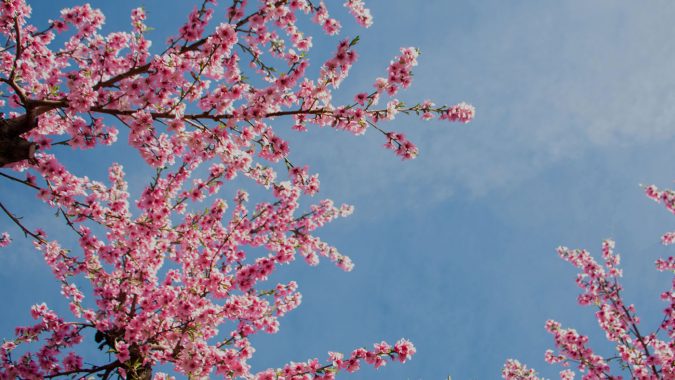
The term dharma (Sanskrit; Pali: dhamma) is frequently used in Buddhism, although its broad meaning can’t be contained in a single-word equivalent in English. The etymological root of the Sanskrit word is “dhri,” which means “to support, bear, hold, maintain or keep.” In that sense, dharma refers to the underlying principles of “cosmic law and order,” “the state of nature,” “ultimate truth” or “nature of all phenomena.”
Dharma also refers specifically to the Buddha’s teachings, and is often called the Buddha-Dharma. And, in formally becoming a Buddhist, one takes refuge in the Three Treasures: the Buddha as example and Buddhahood (enlightenment) as goal; Dharma as the teachings, truth, path and practice; and Sangha (comprised of monastics and Buddhist practitioners) as supporting community.
In regard to dharma as a path or practice, it constitutes a “right way of living” or “path of righteousness” that leads to deepening wisdom and ultimately full awakening and liberation from the suffering of Samsara (the endless cycle of life, death and rebirth). The Buddha has often been likened to a physician who, having diagnosed our “illness,” guides us to a “cure” through the teachings, offering spiritual sustenance on the path.
Every day we take in food to sustain our body. But while our physical body needs nourishment, so too does our soul. The “food” for our soul is Dharma. With Dharma, we grow in insight and wisdom and our soul becomes more awakened. While we have a physical life, spiritually we have what is called “wisdom-life.” Dharma is the spiritual food that can enable our wisdom-life to grow.
Taking in the spiritual food of Dharma, we also gradually develop the ability to endure all things. The conditions of nature are things we need to learn to endure. The ability to endure is also important when interacting with people. For where there are people, there will be people issues arising due to personalities and differences in views. These can cause afflictions in us. But if we understand the Dharma, our minds won’t become afflicted and we can patiently transcend such difficulties.
This ability to endure things, be it nature’s elements or human interactions, is very important. If our capacity to endure isn’t strong, we’ll likely give up on our [spiritual] cultivation when we encounter obstacles and challenges. However, this capacity will grow as we learn, reflect on, and practice the Dharma. Eventually, we can even reach a state where we can peacefully endure everything without feeling that we are enduring anything at all.
Master Cheng Yen continually reminds us of how precious the Buddha-Dharma is, and how we should appreciate the opportunity to learn and practice immensely, especially since coming across the dharma in one’s lifetime isn’t a given.
We’re very blessed for being able to learn Buddhism. In fact, having the opportunity to learn the Buddha’s teachings and cultivate ourselves is very precious. We have to overcome many difficulties in order to do this.
However, since we’re very forgetful, we often don’t remember the Dharma for long. Dharma is like the morning dew. It’s there in the morning, but when the sun comes out the dew evaporates and disappears. Our mind is like this. With our mind in contact with the Dharma, we’ll remember the teachings; out of contact, we tend to forget them, just like the evaporation of the dew. So, it’s very important that we form the habit of listening to Dharma talks and reading Dharma books in our daily life. It can help us reinforce the impact of the teachings.
The Buddha identified that what ails us is rooted in the Three Poisons of ignorance (as to the true nature of reality), attachment and aversion; all three contributing to the mental and emotional afflictions that plague us, causing suffering to self and others. As Master Cheng Yen explains, the dharma leads to insight that can cleanse such impurities.
Dharma can help us understand ourselves better, what habits we have, how we conduct ourselves, and the manner of our speech. When we learn the Buddha’s teachings, we’ll come to know what habits are good and what habits are bad, what kind of conduct is better, and how we should talk to others. Following the teachings can help us improve ourselves.
The Dharma is like water that can cleanse away the layers of impurities in our heart and mind. We have afflictions and inner impurities which create turmoil within us, like a restrictive heat that causes us to be restless and bothered, never at peace. But the Dharma has a cooling and refreshing effect. When we take the Dharma into our hearts, it can dispel or dissolve the afflictions, restoring inner peace and tranquility.
The Dharma is also like water that can nourish the wholesome seeds within us. As I often say, the Buddha’s mission is to guide living beings to sow wholesome seeds of virtue within their heart and mind. When these seeds have been sown, the Buddha provides the water of Dharma so that they can slowly mature.
We need this water of Dharma just as the land needs water. When we’re in a spiritual drought and lack the Dharma, our wholesome seeds can’t grow. As learners of the Buddha’s way, we need to water the wholesome seeds within, so that they can begin to grow roots and at the same time, sprout. We need to take good care of these seeds. We therefore need to mindfully take in the Dharma.
This is the way of Buddhist practice – to take the Dharma into our hearts, to understand its meaning, to touch the truth of the teaching not with our intellect, but with our own heart and experience, and to live out the teaching in practice. Practicing in this way, we can gradually attain liberation from afflictions and achieve inner freedom and peace.
The sections in italics consist of abridged excerpts of material compiled into English by the Jing Si Abode English Editorial Team, based on Dharma Master Cheng Yen’s talks.
































